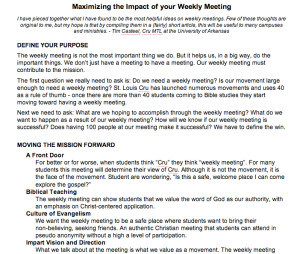The weekly meeting is not the most important thing we do. But it helps us, in a big way, do the important things.
But what is the purpose of our weekly meeting? Who is the weekly meeting for - Christians or non-Christians? What is the role of student leaders in our weekly meeting?
I’ve put together an article that pieces pieced together what I have found to be the most helpful ideas on weekly meetings. Few of these thoughts are original to me, but my hope is that by compiling them in a (fairly) short article, this will be useful to many campuses and ministries.
It’s something your team could read together and discuss – “What are we trying to accomplish with our weekly meeting? In what way does our meeting make ‘outsiders’ feel uncomfortable? Do guys find our meeting attractive?” Our team of students who run our Cru meeting will read and discuss as they start to plan for the fall.
Maximizing the Impact of Your Weekly Meeting
- The Purpose of the Weekly Meeting
- Who is our Audience? (non-Christian or Christian)
- Be New Guy Friendly (HT: Bob Fuhs)
- An Environment of Inclusion (Purge any hint of insider-ism)
- Who Speaks at the Meeting?
- Student Ownership (having a student-run meeting)
- Meeting Elements [Tips on each part of the meeting: No skits! Lots of testimonies. Why announcements are crucial (and should be sparse)]
Would love to get feedback on the article and ways it can be improved (or important concepts to address that I’ve missed).




